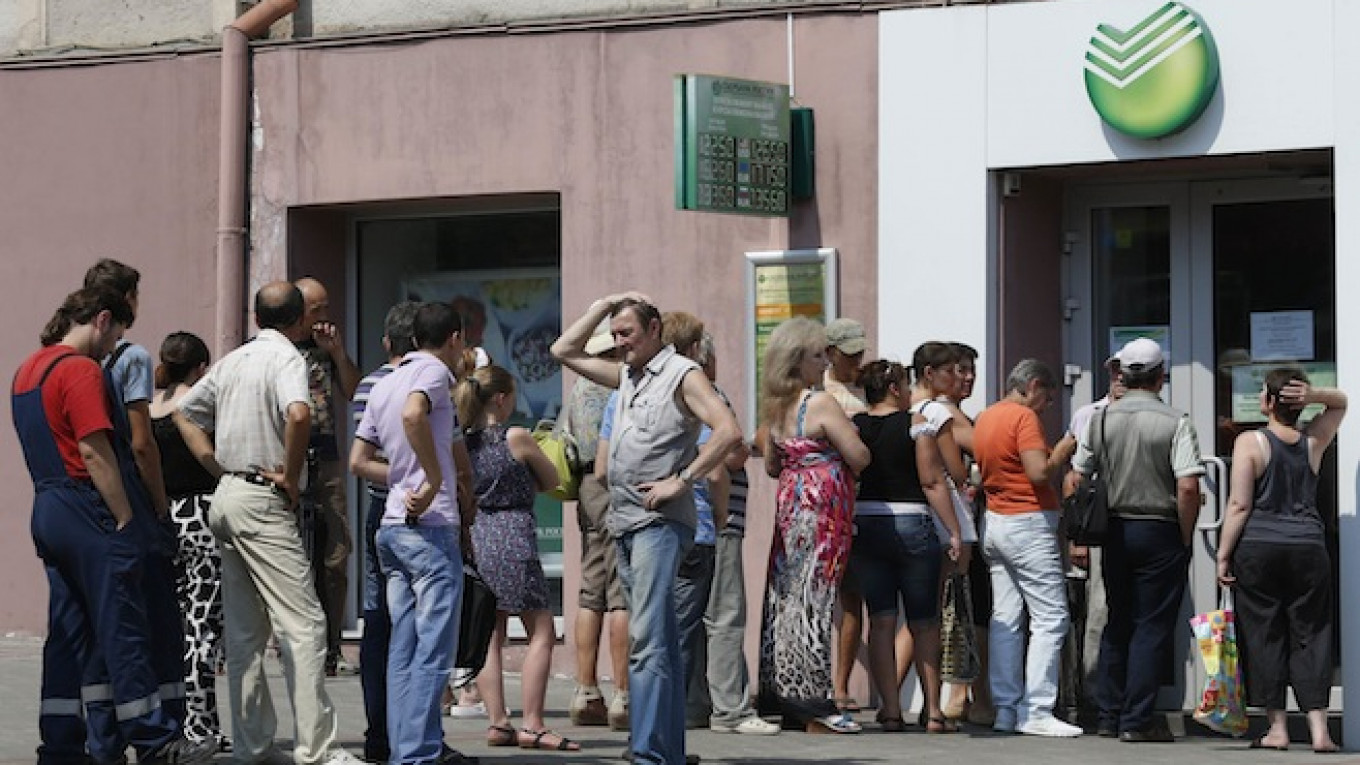Russian shares rose sharply on Monday after index compiler MSCI kept Russia's two largest banks, Sberbank and VTB, in its MSCI Russia index despite both banks being hit by Western sanctions over the Ukraine crisis.
At 2 p.m. in Moscow, the dollar-denominated RTS index was up 1.8 percent to 1,193 points, while its ruble-based peer MICEX traded 1.4 percent higher at 1,367 points.
Sberbank and VTB outperformed the broader market, rising by 3.6 percent and 3.8 percent, respectively, on MICEX.
"Given the decision by MSCI not to exclude the shares of Sberbank and VTB from its indexes, as well as the lack of negative news from Ukraine, we expect the Russian stock market to recover at the start of this week," said Yevgeny Loktyukhov, an analyst at Promsvyazbank.
MSCI held consultations with investors on whether to exclude the banks from its Russia index after the EU banned all its members' nationals and companies from buying or selling new bonds, equity or other financial instruments with a maturity of more than 90 days issued by Sberbank, VTB and three other major state-owned Russian banks.
MSCI indexes are used by many investment funds to determine their weightings, so exclusion from the Russia index could have significantly reduced demand for the banks' shares.
Russian assets were also supported by a lack of escalation in tensions over Ukraine, where pro-Russian separatists are battling Ukrainian government forces in the east of the country.
Moscow has not sent troops to Ukraine — investors' worst fear as that would probably draw another round of Western sanctions — despite Ukrainian forces making significant gains in their military offensive over the weekend and encircling the largest rebel-held city.
The White House said that during a call on Saturday, U.S. President Barack Obama and German Chancellor Angela Merkel "agreed that any Russian intervention in Ukraine, even under purported 'humanitarian' auspices ... violates international law and will provoke additional consequences."
However, fierce military clashes in eastern Ukraine and threats of sanctions by Ukraine against Russia, which may include cutting off energy supplies to EU customers, mean that markets are expected to remain volatile.
"Considering the strengthening of Kiev's position in the south-east of Ukraine and the threats to stop transit of Russian oil and gas to Europe, we expect the continuation of high tensions, at the same time Moscow's reaction looks unclear," BCS analyst Mark Bradford said in a note.
The ruble was marginally weaker against the dollar at 36.15 at 2 p.m., after having briefly strengthened below 36 to the dollar earlier in the day. Against the euro, the ruble was flat at 48.39.
That left the Russian currency almost unchanged at 41.64 against the dollar-euro basket the Central Bank uses to gauge the ruble's nominal exchange rate.
See also:
Ruble Picks Up as Fears of Russian Intervention in Ukraine Subside
A Message from The Moscow Times:
Dear readers,
We are facing unprecedented challenges. Russia's Prosecutor General's Office has designated The Moscow Times as an "undesirable" organization, criminalizing our work and putting our staff at risk of prosecution. This follows our earlier unjust labeling as a "foreign agent."
These actions are direct attempts to silence independent journalism in Russia. The authorities claim our work "discredits the decisions of the Russian leadership." We see things differently: we strive to provide accurate, unbiased reporting on Russia.
We, the journalists of The Moscow Times, refuse to be silenced. But to continue our work, we need your help.
Your support, no matter how small, makes a world of difference. If you can, please support us monthly starting from just $2. It's quick to set up, and every contribution makes a significant impact.
By supporting The Moscow Times, you're defending open, independent journalism in the face of repression. Thank you for standing with us.
Remind me later.






